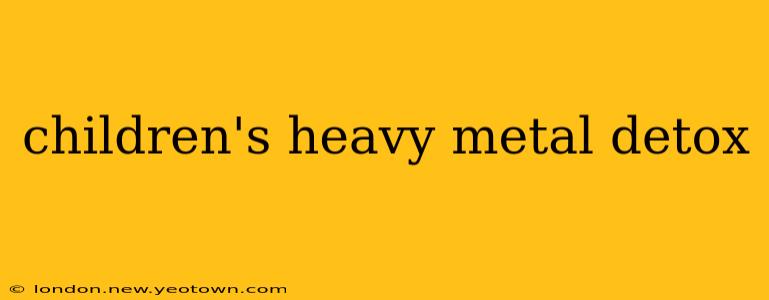The news of heavy metal contamination can be terrifying for parents. We diligently choose organic foods, filter our water, and ensure our homes are safe havens for our little ones. But what happens when we discover that our children may have been exposed to heavy metals like lead, mercury, or arsenic? The thought alone can be overwhelming. This guide explores the concerns surrounding heavy metal exposure in children, the potential health effects, and approaches to supporting their detoxification. Remember, this information is for educational purposes and should not replace professional medical advice. Always consult a healthcare professional before making any decisions regarding your child's health.
What are Heavy Metals, and Why Are They Dangerous for Children?
Heavy metals are naturally occurring elements with a high atomic weight and density. While some metals, like iron and zinc, are essential for health in small amounts, others, such as lead, mercury, and arsenic, are toxic even in trace quantities. Children are particularly vulnerable to heavy metal toxicity because their bodies are still developing, and their systems are less efficient at filtering out toxins. Their brains and nervous systems are especially susceptible to damage.
Imagine a tiny, delicate plant trying to grow in contaminated soil. The heavy metals act like harmful weeds, choking the plant's growth and preventing it from thriving. Similarly, heavy metals interfere with a child's development, impacting everything from brain function to physical growth.
How Can Children Get Exposed to Heavy Metals?
Exposure pathways vary, but some common sources include:
- Lead: Old paint in older homes, contaminated soil, lead pipes (in older plumbing systems), certain imported toys or candies.
- Mercury: Fish consumption (especially larger predatory fish), some dental fillings (although less common now), broken thermometers.
- Arsenic: Contaminated water sources, certain pesticides (though largely phased out), some foods.
- Cadmium: Cigarette smoke (secondhand smoke is a concern), some foods, industrial pollution.
What are the Signs of Heavy Metal Toxicity in Children?
Recognizing the symptoms of heavy metal toxicity can be challenging, as they can mimic other illnesses. Some common signs may include:
- Developmental delays: Difficulty with speech, motor skills, or cognitive development.
- Behavioral problems: Hyperactivity, irritability, aggression, or learning disabilities.
- Gastrointestinal issues: Nausea, vomiting, diarrhea, or abdominal pain.
- Neurological symptoms: Headaches, tremors, seizures, or changes in vision or hearing.
- Fatigue and weakness: Persistent tiredness and lack of energy.
It's crucial to understand that these symptoms aren't exclusive to heavy metal toxicity; a thorough medical evaluation is necessary for accurate diagnosis.
How Can I Help My Child Detox from Heavy Metals?
There's no one-size-fits-all answer, and detoxification strategies should be guided by a healthcare professional. However, certain approaches may be recommended:
- Chelation Therapy: This involves using medications to bind to heavy metals and remove them from the body. It's a medical procedure and should only be performed under strict medical supervision.
- Dietary Changes: A diet rich in fruits, vegetables, and other nutrient-dense foods can support the body's natural detoxification processes. Focus on foods rich in antioxidants and fiber.
- Supportive Therapies: Some healthcare providers may recommend supplements like probiotics, antioxidants, or other nutrients to help support the body's detoxification systems.
Is Chelation Therapy Safe for Children?
Chelation therapy is a medical procedure with potential risks and side effects. It's crucial to carefully weigh the benefits and risks with a qualified healthcare professional. Chelation should only be considered if heavy metal exposure is confirmed and deemed clinically significant.
What foods can help support detoxification?
Foods high in antioxidants (berries, leafy greens) and fiber (fruits, vegetables, legumes) are beneficial for overall detoxification pathways. A healthy balanced diet, rich in whole, unprocessed foods, is essential.
How can I prevent future heavy metal exposure?
Regular home testing for lead (especially in older homes), careful selection of fish, avoiding exposure to cigarette smoke, and ensuring safe water sources are all important preventative measures.
Remember, parental vigilance and proactive measures are crucial in protecting children from heavy metal exposure and supporting their overall well-being. This information is for educational purposes only and does not constitute medical advice. Always seek professional medical advice for any concerns regarding your child's health.

